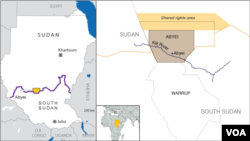The U.N. Security Council voted this week to extend the mandate of the peacekeeping force in the disputed oil-rich Abyei area between South Sudan and Sudan, a region long beset by conflict. It also urged the two countries to resume talks on resolving the area’s status.
Talks toward that goal have long been stalled. Both countries claim the Abyei area, but neither side wants to change the current situation, according to Small Arms Survey researcher Joshua Craze.
“Sudan benefits from the current situation in so far as they control the oil and they placate an important political constituency, the Missiriya,” said Craze. “South Sudan benefits from the current situation because they get to placate the relatively important political constituency, the Dinka Ngok, while not running the risk of alienating Sudan, which is what would happen if they tried to actually press for the territory of Abyei.”
Abyei has been the traditional home of the Ngok Dinka, while northern Arabic-speaking Missiriya herders pass through seasonally with their cattle.
The 2005 peace agreement specified that Abyei residents should have a referendum to determine their status in January 2011. That poll was postponed.
An unofficial referendum took place in 2013, boycotted by the Missiriya, in which participants voted to go with South Sudan. The poll was not recognized by Sudan, South Sudan, or the African Union.
Originally from Abyei, Mustafa Biong is the former director general of South Sudan’s ministry of information. He says that until Abyei’s status can be determined through a proper referendum, there should be another way for people to obtain services and security.
“Our thinking, our people have said they would prefer [that] if the two countries are not prepared for a referendum, let Abyei be put under the United Nations so it can be developed, until the two countries have agreed in the future. Rather than leaving the area without proper administration,” said Biong.
Violence is another problem in the area. Attacks between 2007 and 2011 left tens of thousands of people displaced. In May 2013, a member of the Missiriya killed the Ngok Dinka’s chief.
The U.N. Interim Security Force of Abyei mandate was extended to May 15, 2017, with the Security Council demanding South Sudan and Sudan urgently establish an Abyei Area Administration and Council, as well as a police service that would protect oil infrastructure.





